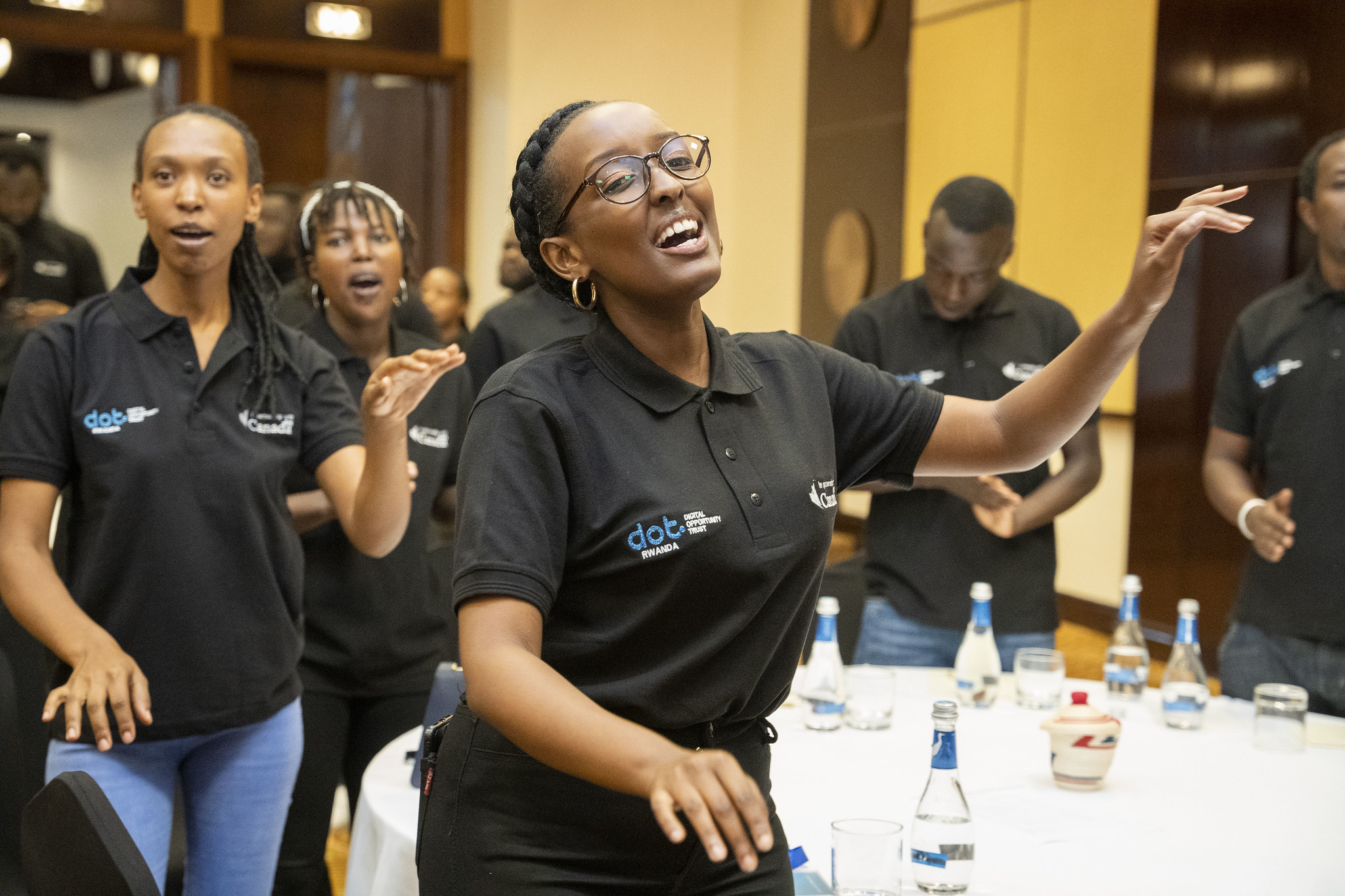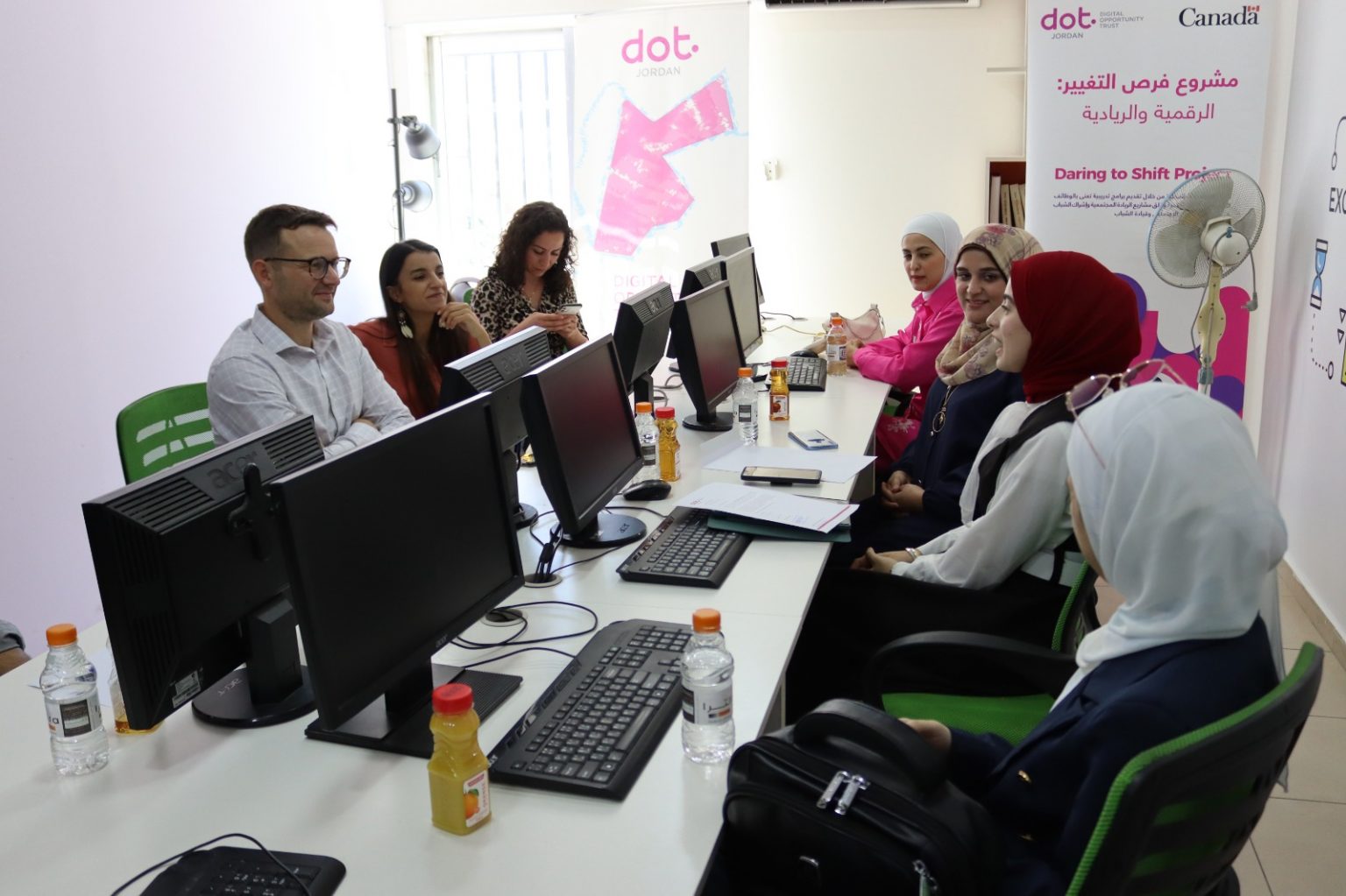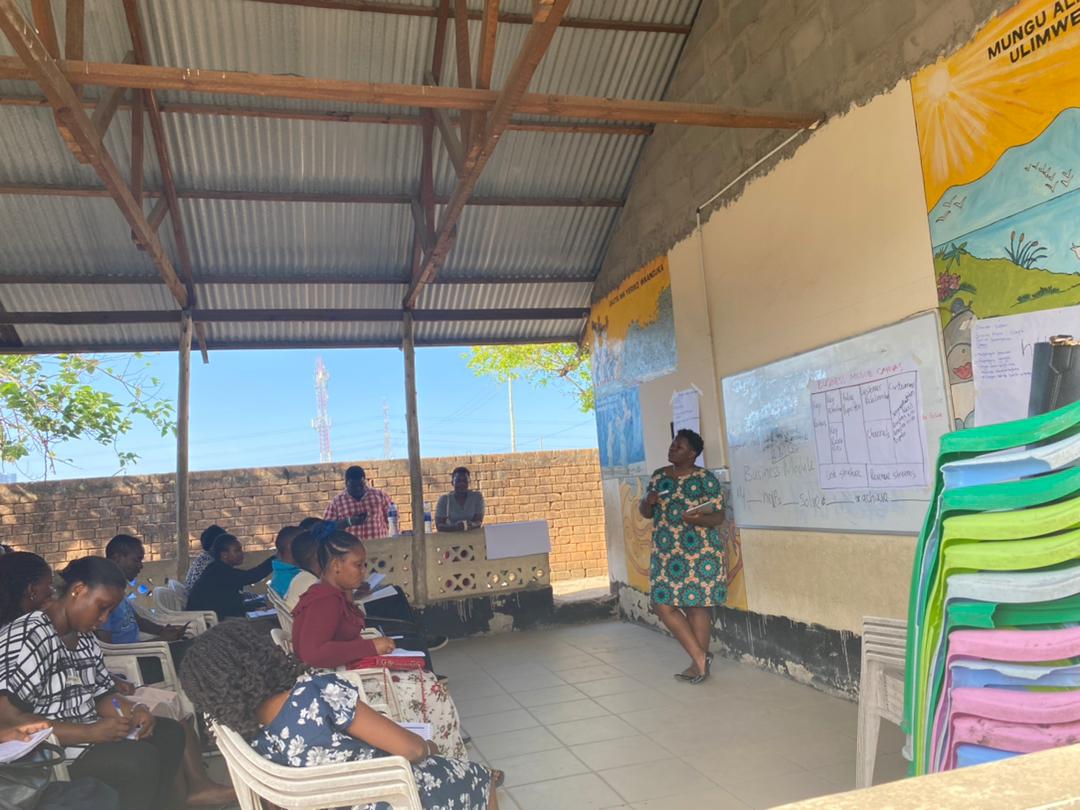Daring to Shift: Youth Voices on Empowerment and Digital Leadership

Sabine Iradukunda Uwase never planned to be a facilitator.
As a child, “I stuttered,” she says. “I avoided every situation where I had to stand in front of people and speak.” When she got to college, she studied agro-forestry and dreamed of working with farmers in her home country of Rwanda on sustainable agriculture projects.
But several months after finishing her degree, the only job she had found was as a sales clerk at a cell phone store. So when she saw a posting from DOT Rwanda looking for young people to facilitate digital business classes, she thought, why not?
Sabine was accepted to the program, and only weeks later, she was doing the unthinkable – delivering a presentation to a packed room of her fellow trainees and their facilitators. “What surprised me most is that I actually felt confident doing it,” she says. Soon after, she was deployed to facilitate her own courses, and she went out armed with a powerful thought:
“I realized that I was now in a position to make other young women feel confident too,” Sabine, Rwanda
Over the course of the Daring to Shift Project implemented by Digital Opportunity Trust in partnership with Global Affairs Canada, DOT’s community leaders program empowered a total of 682 young graduates like Sabine, equipping them with the skills and confidence to become facilitators, mentors, and coaches to their peers. During the nine-month program, these youth leaders were first trained as program facilitators and then deployed to their home communities to facilitate digital skills for business and employment to other young people. That meant that in each of the eight countries where the community leaders program operated –Jordan, Lebanon, Kenya, Rwanda, Ghana, Malawi, Tanzania, and Uganda – it had a profound ripple effect. Sabine, for instance, facilitated business skills to dozens of her peers. And equally importantly, she instilled in them a belief that they could succeed. “I encouraged them to act on their own ambitions,” she says.

Like all of DOT’s work, the community leadership program began with the understanding that young people are engines of transformation in their communities. And it is they, rather than any group of outsiders, who know best what those communities need. Therefore, at every step of the program, youth-led. The community leaders helped define the program’s focus in their countries by contextualizing the curriculum to local needs, for instance, and in some cases co-developed the very materials they later taught. “ What stood out for me was being part of the team that curates content for the Digital Business Program,” recalls Daniel Kasongi, a community leader from Tanzania.
The program had two distinct parts. First, the young people chosen as community leaders completed a one-month training. There, they learned the content they would facilitate. Equally importantly, however, they were taught to see themselves as agents of change. Before Flavian Njoki joined the program in Kenya, for instance, she says she was quiet even in small groups of friends. The idea of standing in front of a room full of people, delivering a talk or facilitating a class, made her stomach twist in knots. But over the course of her training with DOT, she learned to break down public speaking into a series of distinct skills, each of which she could acquire with practice. She studied how to structure presentations for clarity and interest, how to use body language to promote her message, and how to keep an audience energized and engaged.
Soon, she found herself presenting at meetings held by local leaders – some of the most important and respected people in her community – to ask for their help recruiting young people for her digital skills trainings. “It was quite a big step for me,” she says. Other participants saw different kinds of personal growth.
“Being one of the community leaders taught me to be a responsible person who can set goals and manage my time to achieve them,” Ruba, Jordan
But perhaps even more profound than these personal transformations were the wide ripple effect they had on the communities from which the youth leaders came. Take the case of Elly Owange, another community leader from Kenya. He noticed that job advertisements in Kilifi, the rural coastal county where he lived, frequently listed “computer literate” as a key qualification. In Kenya, he heard, as many as 70 percent of jobs required some level of digital literacy.
But few young people in his community had any way to acquire these skills, and so as the world around them shot into the future, he worried they could be left permanently behind. He completed the community leaders training hoping to wrench that future in a different direction. Elly led digital literacy classes in local youth centers and libraries, and eventually taught more than 500 young people. Among his star students was Japhet Nzai, who developed a love for Microsoft Excel and found a job as an online data entry officer. “We can shape a future where youth excel, innovate, and contribute to the digital world,” Elly later wrote.
For young women who took part in the program as either community leaders or their community participants, the transformations were often particularly profound. That is because in many of the places where DOT operates, there is a vast chasm in access to digital technology and education between young men and young women. “The importance of the Daring to Shift project is the empowering of women and girls,” says Lobna Deeb, a community leader in Lebanon, where she and her colleagues empowered more than 2000 women and girls in digital entrepreneurship skills.
Flavian in Kenya agrees. “In my community you’ll find men are quite conversant with computers, so they are confident when applying for jobs, while women are left out,” she says. She has also experienced this gender divide personally. When she was studying IT in college, there were only three women in her class of 45. So when she began recruiting participants for her DOT class on digital skills for employment, she focused specifically on young women. “Many of them, when they first saw a computer [in my class], they were afraid of touching it,” she remembers. “When they learned to use it, I saw the excitement on their faces, that was amazing for me.” The new digital skills they acquired, she says, opened new doors for them professionally.

Soon after the community leadership program ended, Flavian also found herself thinking back to one of the modules she had recently facilitated, on how to interview for a job. By then, she knew the material by heart, and she had no trouble landing a position in IT support and social media for a fertilizer company. Many other community leaders had similar success. In Tanzania, for example, 73 percent of the 101 young leaders secured employment during or after the program, and the average household income of participants in Rwanda grew by 30 percent.
Collectively, these community leaders empowered more than 31,000 of their peers in-demand digital skills, and two-thirds of those participants say their monthly income went up as a result of the program. Today, Sabine in Rwanda has a new job too. She works for a social enterprise focused on agriculture, where she trains farm suppliers in business skills. The work fuses her long-time passion for agriculture with her new-found loves of training and entrepreneurship. “After joining DOT I found out I’m a good speaker, and I’m good at training people,” she says. “I realized I can change people’s mindsets.”
Tags
Are you our next Community Leader, Digital Champion, or Social Innovator? Learn more about how to join #DOTYouth
Join #DOTYouthShare this Post
More ARTICLES
Read more like this.